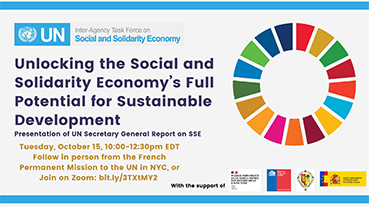The United Nations Task Force on Social and Solidarity Economy (UNTFSSE) presented on October 15 in New York the report of the UN Secretary General entitled “Promoting the social and solidarity economy for sustainable development”. It documents how the social and solidarity economy contributes to achieve the objectives set out in the 2030 Agenda for Sustainable Development and to an inclusive, resilient, sustainable and job-generating recovery. The presentation took place at the hybrid event “Unlocking the full potential of the social and solidarity economy for sustainable development”, organised by UNTFSSE together with the UN permanent missions of France, Chile, Senegal and Spain.
This document, produced by UNTFSSE in collaboration with the International Labour Organisation (ILO), is based on information provided by entities of the United Nations system, as well as by UNTFSSE member and observer organisations, including CIRIEC, which highlights its dissemination work through its social economy observatories and its international institutional and research conferences.
The report highlights the progress made and the challenges encountered since the adoption of General Assembly resolution 77/281 on 18 April 2023, and details the promotion of the social and solidarity economy through legal, regulatory and institutional frameworks, as well as through education, research, financial and non-financial support services, and statistical visibility.
In this last section, the report refers to the recently published research by EURICSE, CIRIEC and Spatial Foresight “Benchmarking the socio-economic performance of the EU social economy”, which provides updated quantitative data on the social economy in the 27 EU countries, and qualitative data documenting the importance of the social economy in six key ecosystems of the European industrial strategy and in the resilience of the social economy to the Covid-19 crisis.
Recommendations for a future of the Social and Solidarity Economy
Finally, the text includes future-oriented recommendations regarding the promotion of this sector, including recognizing the contribution of the social and solidarity economy as a crucial means for creating more sustainable and equitable development; and encouraging all United Nations development entities to incorporate the social and solidarity economy in their planning and programming, improving research, statistics and knowledge management and providing specific policy advice and training, in line with their mandate.
In addition, it underlines the importance of promoting an international economic environment that promotes the values and principles of the social economy by facilitating the access of social economy entities to responsible supply chains and international markets, and promoting fair and sustainable trade, including trade in products derived from biological diversity and alternatives to plastic.
To this end, it calls for encouraging the adoption of inclusive public procurement policies that systematically award contracts to social and solidarity economy entities.







